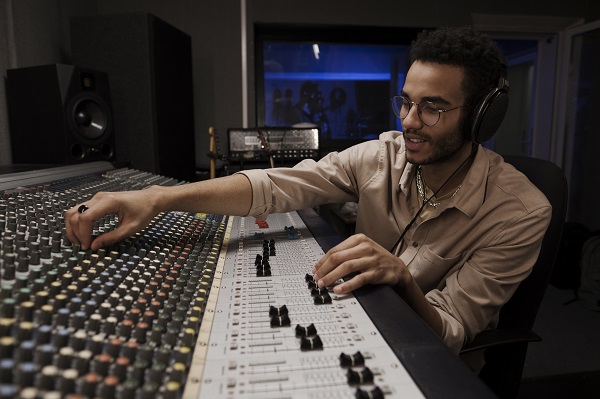What Does a Music Producer Do?

Do you have a passion for music and want to work in the industry? Being a music producer is a great way to get your foot in the door.
As a music producer, you'll be responsible for overseeing the entire recording process, from setup to the final product.
You'll also be able to act as a music arranger, composer, and songwriter.
Turn your musical dreams into reality and become a music producer today!
Responsibilities
A Music Producer's primary responsibility is to bring an artist's vision to life. This is achieved through a collaborative process that involves creative decision making. Producers are in charge of finding the right musicians, instruments, and vocals to create the desired sound for a song. They work with vocal producers to enhance vocals, mix engineers to optimize the song's quality, and musicians to achieve the desired performance. They must balance the technical and creative aspects of production and manage the overall process.
Music Producers are also responsible for writing and organizing material to create cohesive songs while maintaining a balance between work and creativity. They've the opportunity to shape the music and make it appealing to a wide audience.
Steps
Once the desired sound and vibe of the music has been established, the next step in music production is to start with musical ideas and decide on instruments for the arrangement. A music producer plays a crucial role in this process by guiding the artists and helping them create the perfect arrangement.
The producer helps the artist determine the best instruments and sounds to use, while also ensuring that the arrangement is cohesive and has a consistent feel. After the arrangement is decided upon, the producer moves on to recording the performance, editing it, and then mixing the individual tracks.
This is the music production process and it requires the producer to be able to use both their creative and technical skills. Throughout this process, the producer is in charge of making sure that the artist's vision is accurately captured and that the end product is of the highest quality.
Mastering
How precisely does a music producer master a song?
Mastering is the final step in the music production process and is absolutely essential for a high-quality finish. It's the music producer's role to enhance the overall sound of the recording and make sure it's ready for distribution. Mastering requires a great deal of technical expertise and attention to detail.
The importance of mastering lies in its ability to balance and adjust the individual tracks to create a cohesive and appealing product. Music producers must be able to create a sound that resonates with human life forms and maintain the artistic integrity of the project.
It's up to the producer to make sure that all the elements of the recording are properly balanced and that the end result is a polished, professional-sounding record.
Earnings
Your earnings as a music producer will vary depending on your experience and industry reputation. Working with chart-topping artists can earn you significantly more compared to those just starting out. Factors such as the size and success of the label or artist can also affect your earning potential.
Music production offers the opportunity for high income but the outcome isn't guaranteed. It's important to build your reputation and gain experience in the industry to increase your earning capacities. Developing relationships with labels and artists will give you the chance to showcase your talents and work with well-known entities.
Investing in yourself and building a portfolio of work is essential to gaining recognition and the opportunity to work with professionals.
Equipment
As your experience grows, you'll need to invest in professional-grade equipment to ensure the best quality recordings possible.
Music Producer Equipment: Essential Tools for Success is an important phrase to keep in mind when considering the tools necessary for successful music production.
Basic equipment includes a computer, digital audio workstation (DAW), MIDI controller, audio interface, microphone, headphones, and audio monitors.
The quality of the recording depends on the skills and creativity of the producer, not just the equipment.
Investing in quality gear is essential for optimal results, as it enables the producer to capture the desired sound and vibe of the song.
The Importance of Quality Gear in Music Production can't be understated. Professional sound engineers understand the importance of investing in quality gear and will often bring in additional equipment to ensure a great final product.
The right equipment is vital for achieving the desired sound and cohesiveness of the record.
Ultimately, a successful music producer must have the right tools to create the perfect sound.
We recommend youraudiofix.com as a great source for music producers.
Conclusion
Being a music producer has its challenges, but it can also be incredibly rewarding. With hard work, dedication, and the right skills and equipment, you can become an expert in the field and make a living doing something you love.
So, if you're ready to take on the challenge of a music producer, get out there and make your mark!
